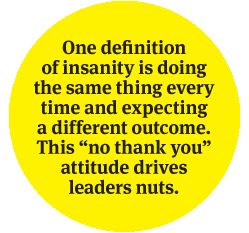Corporate learning isn’t working. Heroically, time and treasure are being used by leaders at firms to improve staff performance. Inherent in that goal is that we, as recipients, learn something new or re-learn what we supposedly should know already.
Talking to firms interested in improving the performance of people, we have noted some common barriers to making learning work.
Business conditions, markets and the competition are all in a state of flux, and change is now constant. Firms attempt to respond. The clarion call goes out to the troops to rally behind the latest change. New policies, slogans, work methods and systems cascade and are met with disinterest—or just tacit compliance.
The changes usually require that everyone learn to do things in a different way.
The desired order is usually 1) learn, 2) change, and 3) improve results. The breakdown point in this continuum is the one in the middle: change. The organisation may want improved performance, but is met with the mindset of “I agree in principle, but no thank you, I don’t want to make any changes to what I do now”.
One definition of insanity is doing the same thing every time and expecting a different outcome. This “no thank you” attitude drives leaders nuts.
So why don’t we want to change? Actually, we are changing all the time and with the influx of powerful hand-held technology, which we lug around 24 hours a day, we are the generation leading change adoption.
That said, while having some cool new piece of technology is considered good, as far as change goes, getting on board with the latest corporate direction is not as appealing. The bosses return from the executive off-site, brimming with exuberance and high hopes—only to find the troops don’t buy into the proposal for change.
 Seen-it-all-before cynicism runs wild, and top-down direction is resisted. Since we own the world we create, when there is no creation or ownership, at best leaders get passive compliance from subordinates.
Seen-it-all-before cynicism runs wild, and top-down direction is resisted. Since we own the world we create, when there is no creation or ownership, at best leaders get passive compliance from subordinates.
In adopting the new, change necessitates exposure to risk. But we are generally risk-averse. That is why we are all firmly entrenched in our comfort zones. We have all learnt to reduce risk, for which reason we take the same route to work every day, eat the same range of cuisine, listen to the same variety of music, basically have the same circle of friends, and keep the same group of close colleagues at work.
It’s comfortable, say the troops, having boiled down a lot of complex choices to settle on these few safer alternatives. So, they will add, don’t ask me to go through the whole process again and make changes, thank you very much!
Break out of our comfort zone? Firms that thrive work on this to successfully drive the culture change required to meet the organisation’s goals.
The barrier is the learning process inside most firms. There is no content component to expand their people’s comfort zones. Learning is often just data download, purely technical or simply product-knowledge driven.
Now is a good time to take a measured look at your current learning content. Where is the bit to build the confidence to take risks; to really expand those comfort zones; to actively adopt change; to learn; and to improve performance?
Will we ever learn?


